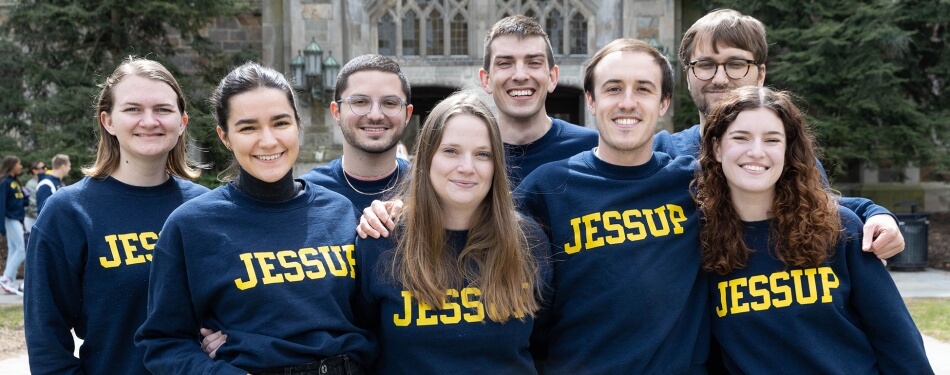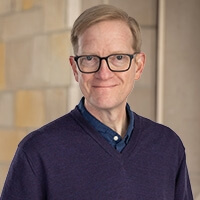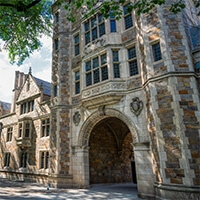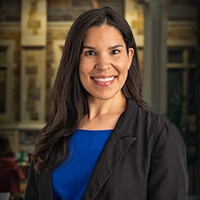The Michigan Law team that participated in this year’s Philip C. Jessup International Law Moot Court Competition racked up its best-ever raw point score while advancing to the semifinal round of the Midwest Regional at Loyola University Chicago.
In addition, two members of the team won oralist awards: 3L and co-captain Frank Sunderland won the award for second-best oralist while 2L James McDonough won the award for 10th-best oralist. Each of the 14 regional teams had four to five oralists.
“The Jessup team makes Michigan very proud,” said Steven Ratner, the Bruno Simma Collegiate Professor of Law. “Our students worked tremendously hard to get this far in the competition. They are great ambassadors for the school and its commitment to international law.”
Michigan’s team also included co-captain and 3L Julia Shults and 1L Emma Wilfong. In addition, 1L Katarina Leskovar served as alternate and of counsel.
“It was great to move on to the advanced rounds,” said Shults, “in part because you’re also going up against teams with very creative arguments and interesting ways that they’re trying to get around the obstacles in the case.”
The competition, which models a case before the International Court of Justice, is the world’s largest moot court competition.
A complex hypothetical case
This year’s hypothetical case concerned the interpretation of a peace treaty, deadly attacks in allegedly occupied territory, unilateral economic sanctions, and the legal consequences of failing to dispose of hazardous waste properly.
“So we have issues of territorial law—which is classic, public international law,” said Talin Hitik, a Chicago-based attorney and academic affiliate at the Law School who coached the team. “We also have international humanitarian law and the conduct of hostilities in an armed conflict.” Layered atop this scenario was an environmental issue involving the transportation of hazardous waste and whether it was in compliance with international environmental law.
Having four very complex, interplaying issues was a great learning experience for the team, said Sunderland.
“I found it to be incredibly helpful because you apply the concepts that you learn about in international law class—how they work in state conduct, how states interact with each other, and the decisions they choose to make. Plus, at least for the topics that the Jessup problem deals with, you’re going into so much detail. It improved my understanding of how the law of war works.”
In person again
This year’s competition returned to its pre-COVID, in-person format. In 2022, the organizers—the International Law Students Association (ILSA)—held one online competition in which all US teams competed against each other in a kind of national round, regardless of region.
This year’s competition capped a process that began in September, when ILSA released the problem and the students began their research and writing of the brief, known in this competition as the memorial. Shults was responsible for economic sanction and public health issues, and Sunderland was responsible for two law of war issues. Three 1L students—Jude Rich, Alec Fischbein, and Isobel Blakeway-Phillips—served as team advisers, helping to offer administrative support and advice on general issues of public international law.
The deadline for the memorial was mid-January, leaving the team with only three weeks to prepare for oral argument. Those three weeks proved very intense for the team, who did up to six moots per week. Helping with the moots were Ratner, Professor Karima Bennoune, ’94, lecturer Joshua Chinsky, and the 1L advisers.
“It’s a wonderful way to bring in 1Ls, so that they understand what Jessup is,” said Shults, who was an adviser to the team during her 1L year. Hitik adds that the advisers will be a bridge to next year, providing important continuity.
“They already have this amazing foundation of the principles of public international law,” said Hitik. “So when you carry over all that knowledge, it’s incredibly valuable.”
They will also carry over the lessons of being part of a team.
“As a team, it felt really nice seeing all of the hard work that we put into it really pay off,” said Sunderland. “The team dynamic this year was great. People worked hard, and we got along very well. It was great that we could all share in the success.”
Banner Photo: The Michigan Law team and advisers, from left to right: Emma Wilfong, Isobel Blakeway-Phillips, Jude Rich, Julia Shults, Jimmy McDonough, Frank Sunderland, Alec Fischbein, and Katarina Leskovar.







